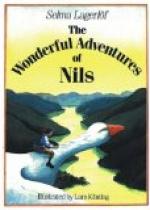The mother talked long with her son, and while she was speaking he stopped weeping. Gradually his features softened; he looked like another person. All the while he was stroking the wasted old hand.
“Now we may as well retire,” said the old lady when she saw that he was calm again.
“No,” he said, suddenly rising, “I cannot retire yet. There’s a stranger without whom I must shelter to-night!”
He said nothing further, but quickly drew on his coat, lit the lantern and went out. There were the same wind and chill without, but as he stepped to the porch he began to sing softly. He wondered if the horse would know him, and if he would be glad to come back to his old stable.
As he crossed the house yard he heard a door slam.
“That shed door has blown open again,” he thought, and went over to close it.
A moment later he stood by the shed and was just going to shut the door, when he heard a rustling within.
The boy, who had watched his opportunity, had run directly to the shed, where he left the animals, but they were no longer out in the rain: A strong wind had long since thrown open the door and helped them to get a roof over their heads. The patter which the master heard was occasioned by the boy running into the shed.
By the light of the lantern the man could see into the shed. The whole floor was covered with sleeping cattle. There was no human being to be seen; the animals were not bound, but were lying, here and there, in the straw.
He was enraged at the intrusion and began storming and shrieking to rouse the sleepers and drive them out. But the creatures lay still and would not let themselves be disturbed. The only one that rose was an old horse that came slowly toward him.
All of a sudden the man became silent. He recognized the beast by its gait. He raised the lantern, and the horse came over and laid its head on his shoulder. The master patted and stroked it.
“My old horsy, my old horsy!” he said. “What have they done to you? Yes, dear, I’ll buy you back. You’ll never again have to leave this place. You shall do whatever you like, horsy mine! Those whom you have brought with you may remain here, but you shall come with me to the stable. Now I can give you all the oats you are able to eat, without having to smuggle them. And you’re not all used up, either! The handsomest horse on the church knoll—that’s what you shall be once more! There, there! There, there!”
THE BREAKING UP OF THE ICE
Thursday, April twenty-eighth.
The following day the weather was clear and beautiful. There was a strong west wind; people were glad of that, for it dried up the roads, which had been soaked by the heavy rains of the day before.




